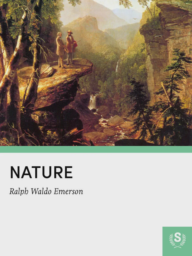

Nature (1836)
by Ralph Waldo Emerson


In a higher manner, the poet communicates the same pleasure. By a few strokes he delineates, as on air, the sun, the mountain, the camp, the city, the hero, the maiden, not different from what we know them, but only lifted from the ground and afloat before the eye. He unfixes the land and the sea, makes them revolve around the axis of his primary thought, and disposes them anew. Possessed himself by a heroic passion, he uses matter as symbols of it. The sensual man conforms thoughts to things; the poet conforms things to his thoughts. The one esteems nature as rooted and fast; the other, as fluid, and impresses his being thereon. To him, the refractory world is ductile and flexible; he invests dust and stones with humanity, and makes them the words of the Reason. The Imagination may be defined to be, the use which the Reason makes of the material world. Shakspeare possesses the power of subordinating nature for the purposes of expression, beyond all poets. His imperial muse tosses the creation like a bauble from hand to hand, and uses it to embody any caprice of thought that is upper-most in his mind. The remotest spaces of nature are visited, and the farthest sundered things are brought together, by a subtle spiritual connection. We are made aware that magnitude of material things is relative, and all objects shrink and expand to serve the passion of the poet. Thus, in his sonnets, the lays of birds, the scents and dyes of flowers, he finds to be the shadow of his beloved; time, which keeps her from him, is his chest; the suspicion she has awakened, is her ornament.🏁
Global Leaderboard
| # | Player | Time | Duration | Accuracy | WPM | pp | |
|---|---|---|---|---|---|---|---|
| 1 | |||||||
| 2 | |||||||
| 3 | |||||||
| 4 | |||||||
| 5 | |||||||
| 6 | |||||||
| 7 | |||||||
| 8 | |||||||
| 9 | |||||||
| 10 |


In a higher manner, the poet communicates the same pleasure. By a few strokes he delineates, as on air, the sun, the mountain, the camp, the city, the hero, the maiden, not different from what we know them, but only lifted from the ground and afloat before the eye. He unfixes the land and the sea, makes them revolve around the axis of his primary thought, and disposes them anew. Possessed himself by a heroic passion, he uses matter as symbols of it. The sensual man conforms thoughts to things; the poet conforms things to his thoughts. The one esteems nature as rooted and fast; the other, as fluid, and impresses his being thereon. To him, the refractory world is ductile and flexible; he invests dust and stones with humanity, and makes them the words of the Reason. The Imagination may be defined to be, the use which the Reason makes of the material world. Shakspeare possesses the power of subordinating nature for the purposes of expression, beyond all poets. His imperial muse tosses the creation like a bauble from hand to hand, and uses it to embody any caprice of thought that is upper-most in his mind. The remotest spaces of nature are visited, and the farthest sundered things are brought together, by a subtle spiritual connection. We are made aware that magnitude of material things is relative, and all objects shrink and expand to serve the passion of the poet. Thus, in his sonnets, the lays of birds, the scents and dyes of flowers, he finds to be the shadow of his beloved; time, which keeps her from him, is his chest; the suspicion she has awakened, is her ornament.🏁